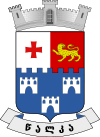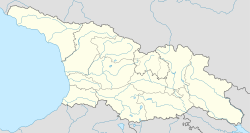Tsalka
| Tsalka წალკა |
|||
|---|---|---|---|
 |
|||
|
|||
| Location of Tsalka in Georgia | |||
| Coordinates: 41°35′0″N 44°05′0″E / 41.58333°N 44.08333°ECoordinates: 41°35′0″N 44°05′0″E / 41.58333°N 44.08333°E | |||
| Country |
|
||
| Mkhare | Kvemo Kartli | ||
| Population (2002) | |||
| • Total | 1 700 | ||
| Time zone | Georgian Time (UTC+4) | ||
| Climate | Dfb | ||
Tsalka (Georgian: წალკა, Ćalḱa, [tsʼɑlkʼɑ]), is a town and municipality center in southern Georgia's Kvemo Kartli region.
The district had a population of 22,000. According to the 2002 census 55% of its population is Armenian, 22% Caucasus Greeks, 12% Georgian, and 9.5% Azerbaijanis. Up until the 1990s, Russian served as the language of interethnic communication and was the language of education in most of the schools in the Tsalka district. Some of the Tsalkan Greeks were Turkophone, and are known as Urums. In the past they used to be the majority in the town of Tsalka but now their numbers have considerably decreased due to their return to their homeland of Greece and due to emigration. Several thousand ethnic Georgians who had suffered from landslides in Svaneti and Adjara were settled in Tsalka in 1997-2006. The settlement of these newcomers sometimes led to ethnic tensions with Tsalka's original Greek and Armenian population. According to the 2014 Georgian census, there were only 2,113 Greeks in all of Kvemo Kartli, indicating a further massive drop in numbers of Tsalkan Greeks.
There are important historical monuments in Tsalka. Kldekari Fortress (ninth century) and the church of St.George in Dashbashi (tenth-eleventh centuries). Dashbashi canyon is also an interesting tourist attraction.
...
Wikipedia



